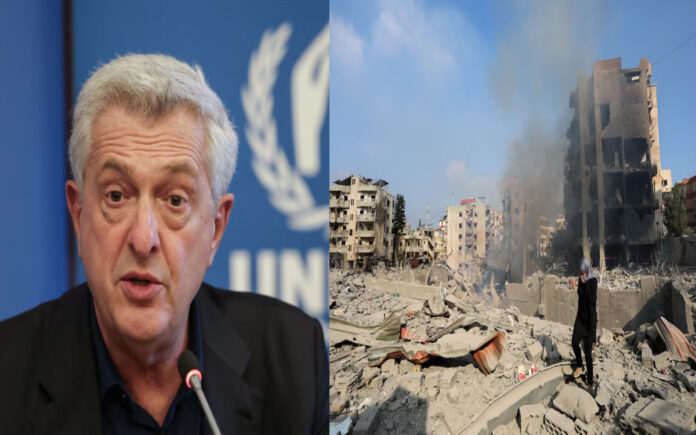Beirut: UN High Commissioner for Refugees, Filippo Grandi, stated on Sunday that Israeli airstrikes in Lebanon have violated international humanitarian law, citing civilian infrastructure damage and the loss of civilian lives. “Unfortunately, many instances of violations of international humanitarian law in the way the airstrikes are conducted have destroyed or damaged civilian infrastructure, killed civilians, and impacted humanitarian operations,” Grandi told reporters in Beirut.
Grandi’s visit comes as Lebanon grapples with the displacement of over 1.2 million people, triggered by Israel’s intensified air and ground operations, which are primarily targeting Iran-backed Hezbollah. Initially, fighting was mostly concentrated in the Israel-Lebanon border region, running parallel to Israel’s war in Gaza against Hamas.
Grandi called for all parties involved and those exerting influence over them to “stop this carnage that is happening both in Gaza and in Lebanon today.”
According to the Lebanese health ministry, more than 2,000 people have been killed and nearly 10,000 injured in Lebanon over the past year, with most of the casualties occurring in recent weeks. Israel reports that approximately 50 civilians and soldiers have died as a result of the conflict. While Israel asserts that its operations target military capabilities and aim to minimize civilian harm, Lebanese authorities accuse Israel of deliberately targeting civilians. Israel has countered, accusing Hezbollah and Hamas of using civilians as human shields, allegations both groups deny.
Grandi added that the World Health Organization informed him of “egregious violations of IHL in respect of health facilities in particular that have been impacted in various locations of Lebanon,” referring to international humanitarian law. He further mentioned that attacks on civilian homes could also constitute violations, but noted that these incidents require further evaluation.
Also Read | Rockets from Gaza Strike Israel as Hezbollah Targets Haifa Base Ahead of Hamas Attack Anniversary
The ongoing fighting has forced approximately 220,000 people to flee Lebanon into Syria, with 70% of these refugees being Syrians and 30% Lebanese, Grandi stated, acknowledging that these figures are conservative estimates. The situation was exacerbated when Israeli forces bombarded the main border crossing between Lebanon and Syria at Masnaa on Friday, which Grandi described as a “huge obstacle” to the movement of refugees.
Many of the Syrians leaving Lebanon had originally sought refuge there, escaping the Syrian civil war that began in 2011. Grandi highlighted that this moment presents an opportunity for the Syrian government to ensure the safety and security of returnees, allowing them to return to their homes or other places of residence.



